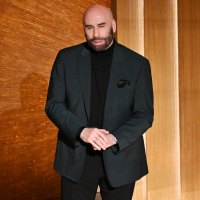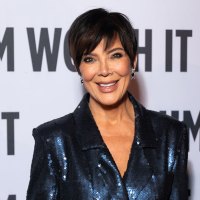Stomach-churning news? On the Tuesday, April 5, finale of FX’s The People vs. O.J. Simpson: American Crime Story, O.J. Simpson (Cuba Gooding Jr.) finally received a verdict after the run of his life and the trial of the century. To find out what happened and how the defense and prosecution handled it, read on!
Game Day
The episode began with Johnnie Cochran (Courtney B. Vance) greeting O.J. with fresh clothes for court and saying, “Today’s the day.” It looked like O.J. was going to get his wish to testify, and Johnnie told him that if he got a chance to talk, he better not stop.
Once in the courtroom, though, Johnnie threw a curveball. O.J. wasn’t going to testify; he was going to “make a brief statement.” As Johnnie predicted, prosecutor Marcia Clark (Sarah Paulson) stood up to object, but Judge Lance Ito (Kenneth Choi) allowed O.J. to go on.
O.J. gave an emotional speech about trusting the jury’s integrity and believing that they would realize he “did not and could not and would not commit this crime.”
After that, Johnnie announced that the defense had no further witnesses. However, the defense may have rested, but Johnnie couldn’t let his guard down in real life. Outside of the courtroom, his staff whispered frantically about the 20 death threats their boss had received.
Famous Last Words
During closing arguments, Marcia made an emotional appeal to the jury, reminding them that though Detective Mark Fuhrman (Steven Pasquale) was a disgusting racist, his detestability should not allow a man with tons of evidence stacked against him to walk free. She reminded them that there was inherent conflict in the defense’s narratives that the police were incompetent idiots who mishandled evidence while simultaneously being brilliant enough to plant evidence on a wildly famous man.
After she reviewed the evidence for them in painstaking detail, her partner Chris Darden (Sterling K. Brown) stood up to remind them of the numerous domestic violence incidents that the murdered Nicole Brown had called 911 about while married to or dating O.J. The defendant sat quietly and furiously in the background as Chris recounted the ninth of those incidents, during which Nicole told police O.J. was eventually going to kill her. O.J. began to cry.
Johnnie got up to give his closing speech and matched O.J.’s reserved sadness with an equivalent level of passion and excitement. His swift hand movements and booming voice captivated the jurors. He told them that they had the power to change the fate of black people who are unfairly profiled by cops every day across America.
“If you don’t stop this cover-up, who will?” he asked before delivering his final words, which referenced the too-small glove O.J. had tried on earlier in the case: “If it doesn’t fit, you must acquit.”
Jury Fury
The jury began deliberating, taking a “straw poll” of guilty and not guilty votes before starting. Ten believed he was not guilty. Two voted guilty. As everyone began arguing back and forth, it became obvious that the defense’s narratives about the LAPD being incompetent and malicious were working.
“Look, you might think he did it,” said the forewoman. “Hell, I might think he did it. But can we honestly sit here and say they proved it?”
After half a day, there was a verdict. The lawyers — who were all on their way to vacation destinations, sure that deliberations would take days or weeks — were called back to court.
“God, they discussed this case less than anybody in America!” whined Bob Shapiro (John Travolta).
The Verdict
Police were shown preparing for possible riots. Johnnie enlisted an arm of Louis Farrakhan’s Nation of Islam to protect him and the defense team as they entered and exited the courthouse. Shapiro was furious about the optics of this move and wanted nothing to do with it, speeding away from the Nation’s security vans as protesters were shown taking to the streets in advance of the verdict.
With all the chaos outside the courthouse, O.J. was relatively calm inside his cell as his guard told him he had heard rumors he’d get off. O.J. signed a football for the guard’s kid.
Inside the courtroom, Judge Ito implored the dead-silent room full of people to remain calm as images of people across the country watching the proceedings on television flashed across the screen.
The verdict was read.
O.J. was found not guilty.
Some people watching the proceedings from home stood and cheered. In the courtroom, the families of Nicole Brown and Ron Goldman cried. Marcia, Chris and everyone else looked shocked. In her Chicago studio, even Oprah Winfrey was speechless.
The Shame Game
As reporters fled the courthouse to get to their newsrooms, Robert Kardashian (David Schwimmer) dizzily tripped into the bathroom and threw up into the sink. Upon leaving the courtroom, he sadly looked at Marcia, who turned away.
Later, in private, Marcia began to sob, saying, “I’m so ashamed.”
Gil Garcetti (Bruce Greenwood) put aside his own career worries to comfort her, telling her she did everything she could and never played the defense’s games. Then, Gil gave the prosecution’s address to the press, inviting Marcia to express her gratitude to the Goldmans and the Browns.
She pleaded with victims of domestic violence who might be watching to not allow the verdict to make them lose faith in the system set up to help them. She told them to always come forward, no matter what.
Chris couldn’t finish his speech because he started crying and simply hugged the Goldmans. Later, as the family got into their car, they listened as a radio reporter played audio of people celebrating O.J.’s verdict in the street.
The Civil Fights Movement
Johnnie approached Chris and offered to help him get back into the black community, and Chris snapped that he’d never left it and that Johnnie mistakenly believed his victory was a civil rights milestone. Chris was able to finish his speech this time.
“Police in this country will keep arresting us, keep beating us, keep killing us,” Chris told his opponent. “You haven’t changed anything for black people here, unless, of course, you’re a famous rich one in Brentwood.”

Johnnie stood silently, then went to his victory party, where he and his team watched news clips of anchors talking about an impending investigation into the LAPD’s use of force. They said it was sparked by Johnnie himself.
As he watched President Bill Clinton discuss racial disparity in America, he whispered, “That’s the victory. Our story is now out of the shadows.”
A New Kind of “Brentwood Hello”
Chris approached Marcia to tell her he was resigning because the politics were too much for him. Marcia countered that people like him, who had “something to avenge,” needed to be prosecutors. Then she explained that her own rape had impacted her career by making it clear to her that she had something inside of her that seeks vengeance for victims.
Sadly, she told Chris that her rapist had walked free, just like O.J., and she was starting to see that not everyone was fueled by a desire for justice like they were.
When O.J. came out of prison, he reunited with Kardashian, whose own sense of justice caused him to cry. O.J. mistook it for joy and patted his friend on the back as he started making “party of the century” plans for that evening.
“I’m back, Brentwood — I’m back!” he yelled as a crowd of protesters met them outside of his home. It turned out the affluent members of the Brentwood community were not as happy about his verdict as other residents of Los Angeles were.
Neither were his and Nicole’s kids’ caretakers, who didn’t allow the children at his house to welcome him.
One Is the Loneliest Number
At the “party of the century,” O.J. noticed that none of his old friends were in attendance. He was surrounded by strangers. Kardashian watched from the sidelines as O.J. stood before the group and vowed to catch the killers of his ex-wife and her friend.
The attorney turned and walked out. When O.J.’s son stopped him and asked where he was going, Kardashian curtly replied, “I’m gone, Jason.”
Jason was then tasked with telling his father that his former favorite restaurant, The Riviera, wouldn’t accept their reservation.
A lonely O.J. walked to his backyard and stared at the life-size statue of himself in his football glory days. He could hear crowds screaming and cheering for him … but the cheering abruptly stopped.
He was alone.
Tell Us: Did the jury make the right call?




